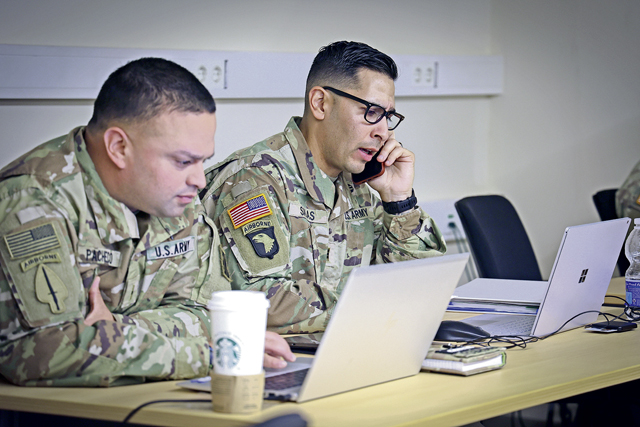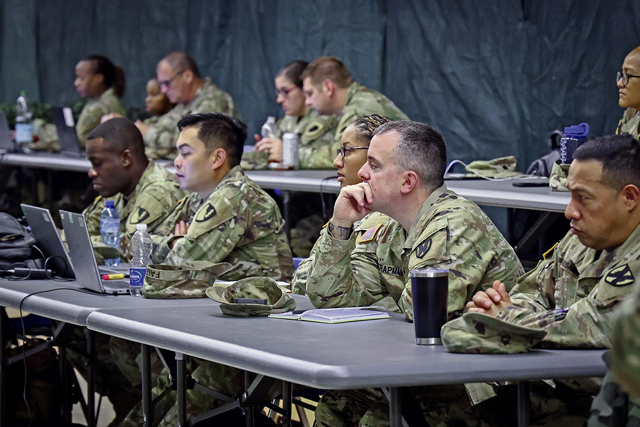
Logisticians and planners from U.S. Army Europe-Africa, 21st Theater Sustainment Command and selected U.S. Army units based in the continental United States gathered for a Logistics and Movement Conference at Rhine Ordnance Barracks, Kaiserslautern, Oct. 16-20. Participants finalized movement requirements for DEFENDER 24, an annual U.S. European Command-directed multi-national, joint exercise designed to build readiness and interoperability between U.S. and NATO Allies and partners.
“For Soldiers to fight and win on the battlefield, they need weapons to fire, tanks to drive, food to eat and logistics support to ensure those necessities get to the right place at the right time,” said conference organizer and 21st TSC exercise planner Capt. Ira White.
Logistics considerations influence the planning and execution of operations at all levels of warfare, according to the U.S. Army Maneuver Center of Excellence.
Ray Montanez, USAREUR-AF lead sustainment planner, knows how to exert that influence in Europe. He has been a part of DEFENDER exercise planning since 2018.

“Doing logistics in Europe is a little bit complicated because of all the rules and regulations we have to comply with in different countries,” said Montanez. He cited multiple factors that must be considered, including different country requirements and approval timelines for crossing borders, diplomatic clearances, disinfection protocols to protect against African swine fever and host nation capabilities.
According to Montanez, joint training with allies helps streamline those processes and improve host nation capabilities. Familiarizing allies with U.S. operations, and vice versa, enhances interoperability.
“Sometimes they [allied and host nations] do operations completely different from what we do,” said Montanez. “But when we come over and they see how we operate, they try to emulate that. And we always have someone there to provide the guidance, the SME [subject matter expert] for that area.”
For CONUS-based units, participating in the Logistics and Movement Conference ensures they get maximum training benefit from their time in Europe.
Chief Warrant Officer 2 Dustin Trimmer, of the 244th Expeditionary Combat Aviation Brigade out of Fort Knox, Kentucky, said that after coordinating with 21st TSC and the relevant host nation, they determined they should use a different airfield than originally planned.
“We’ve already identified a new staging point, which actually is strategically easier for us in terms of getting the aircraft fully prepped for when the mission kicks off,” said Trimmer. “And it also provided a closer location for our main body to come in and only have an hour trip to the actual training area.”
Trimmer said he looks forward to working with allied and partner militaries and demonstrating how his brigade supports the warfighter.
“From the 244th perspective, we’re hoping to show our capabilities, where we have multiple airframes…moving equipment from one location to another faster than it would be by ground,” said Trimmer. “We also bring in aeromedical units that are fully capable to provide real life, life-saving support, if needed during the mission.”
Trimmer said the conference allowed him to finalize equipment needs and hammer out how the 244th ECAB will get food and water during DEFENDER 24.
Figuring out how to feed the force is Chief Warrant Officer 3 Norberto Salas’ primary objective. As 21st TSC Senior Food Advisor, Support Operations, Salas supports food service assistance across the European theater. For DEFENDER exercises, his team coordinates with allied and partner nations and exercise planners to make sure the U.S. maximizes host nation capabilities.
“In addition, we augment anywhere that we identify the shortfall to help achieve the commander’s intent,” said Salas.
Salas, who has been a Class I planner for the past two DEFENDER exercises, said working with host nations offers opportunities to establish relationships and identify capabilities outside of the U.S. military that can help meet the mission. He said the conference was an invaluable opportunity for multiple entities to work in-person to review and validate systems, processes, locations and needs.
“The benefit of everyone coming together for this one week is to help refine our requirements, track what the units are tracking…how they see their support…so that we can make sure that we capture those requirements, and it meets what they’re tracking and what we’re capable of doing.”
According to White, in addition to finalizing all logistical and movement requirements for units participating in DEFENDER 24, a major conference objective was to build a cohesive sustainment team for the exercise.
Capt. Michael Lee, V Corps operations officer, said working directly with coordinating units at the conference alleviated the “stonewall effect” of working solely via computer.
“For us, this is a time where we can communicate with the customer units face to face, which is a better way to do business,” he said. “It gives us a way into their operations plan and what they are going to be doing at the training areas. What we want to focus on is how the units will go from CONUS to OCONUS, and be able to integrate into the theater properly, safely, and get the best training they can receive at that location.”
Lee said he appreciated the opportunity to collectively examine friction points and problem-solve as sustainers.
The 21st Theater Sustainment Command is U.S. Army Europe and Africa’s lead organization for all sustainment activities including logistics support, transportation, combat sustainment, human resources, finance, contracting and all other areas in the field of sustainment. The command also serves as the responsible headquarters for USAREUR-AF’s military police, medical and sustainment brigades, providing combat engineers, military police and medical professionals during partnership training and other operations in support of not only USAREUR-AF, but also NATO, U.S. European Command, U.S. Africa Command, and U.S. Central Command.
For more information on the 21st TSC visit https://www.21tsc.army.mil/


